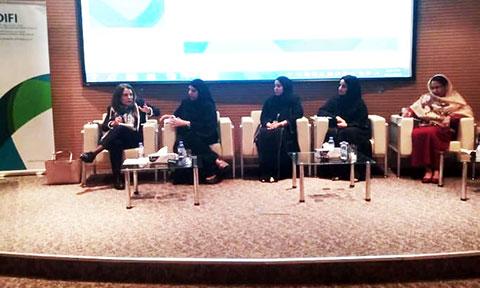

HPC participated in the “First Population and Sustainable Development Forum: Towards a new perspective on the relationship between population and sustainable development”, which was held in Qatar and organized by the Permanent Population Committee in cooperation with Qatar University, Qatar Social Work and Doha International Family Institute, with the support of UNFPA. The Forum’s agenda was concluded on Tuesday.
The Forum aimed to discuss the relationship between population and sustainable development within the framework of the 2030 sustainable development agenda. The discussion involved clarifying the correlation between human resources and sustainable development, analyzing the challenges faced by youth in order to maximize their role in the realization of the sustainable development goals, discussing and analyzing family-focused policies and their impact on the realization of the sustainable development goals, developing proposals to face the challenges faced by Qatar’s demography and coming up with a set of recommendations in relation to the relationship between human resources and sustainable development.
While presiding over a session on “family policies and sustainable development”, HPC Secretary, Dr. Abla Amawi, reaffirmed that sustainable human development includes both economic and social development rather than economic development alone. Moreover, she stated that sustainable human development places humans at its center as its basis and purpose, deals with the human and social dimensions of development as the dominant feature and considers material capacities as a condition of its realization, without overlooking their undeniable importance.
Amawi pointed out that sustainable human development is considered a perspective that addresses development in a manner concerned with how to distribute the fruits of development and with its social and environmental implications as well as its sustainability and ability to optimize the efforts of its beneficiaries.
Furthermore, Amawi noted that the core of the sustainable development implementation process is directly connected to the population dynamics in general, and to the demographic transition, in particular. For example, the rapid population growth, urbanization and the dimensions of forced asylum all have negative consequences such as higher poverty and unemployment rates and poor infrastructure services, in addition to issues related to the environment, providing water sources, achieving optimization of energy resources, providing adequate housing for low-income persons and social services.
Amawi also stated that Jordan Vision 2025 came as reflection of a comprehensive approach that considers the priorities of sustainable development and integrates them in public strategies and policies and national plans and programs. Furthermore, the Vision also connects the public budget with the development agenda by strengthening the statistical systems, providing data, and developing a monitoring and follow-up system for the sustainable development indicators on the national level and for the governorates.
It is worth noting that the Forum’s agenda involved seven axes that were discussed through 28 working papers on the different factors affecting sustainable development. These factors include demography, health, economic and social capital, the role of CBOs and civil society institutions as well as the role of youth and family policies in this regard.
Under these axes, a number of issues relating to population and development were also discussed in the Forum. These issues included international migration, population change, reproductive health, population and environment interactions, consequences of population ageing, issues related to children, youth, education and labor forces and the implications of population policies on the realization of sustainable development goals. The Forum also focused on the developments in the methods and data of population phenomena measurement and the evaluation of the progress towards achieving the goals related to health, education, environment, labor forces and development.







